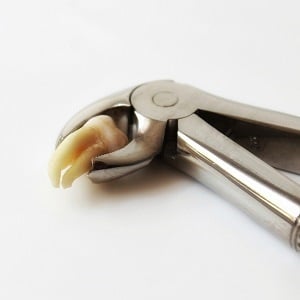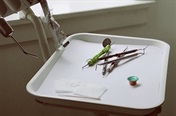
The wisdom teeth are the third set of molars and the last to grow into the mouth.
Your first adult teeth usually start to erupt at the age of six years, while the wisdom teeth tend to erupt between 16 and 21 years of age – in other words, at a more mature, “wiser” age. Most people have four wisdom teeth in total, one in each corner of the mouth.
The tooth-eruption process can be painful, no matter what your age. Ask any mother with a six-month-old baby how her sleep patterns are affected by her baby’s teething. In the same way, eruption can be painful and uncomfortable in your adolescent and adult years.
Common problems with wisdom teeth
For various reasons, the space where the wisdom teeth should sit in the jaw isn’t always adequate. As a result, these teeth may not be able to grow completely into the mouth, getting stuck either partially or completely under the gum (i.e. they may become impacted). This may cause pain and infection.
A common problem is that the top wisdom tooth grows out first. As the bottom one starts growing, the top one “bites” into the gum covering the erupting bottom wisdom tooth, injuring the tissue. This then gets infected by the normal bacteria that live in the mouth, causing severe pain.
Other common problems include:
- Partial eruption leading to a “flap” of gum that covers part of the tooth. This can make proper cleaning difficult, which could lead to infection, pain and decay.
- Difficulty cleaning the wisdom teeth because the molars sit so far back in the mouth.
- Damage to the “12-year-old” molar, i.e. the second adult molar that sits right next to the wisdom tooth.
- A tooth coming in at the wrong angle, leading to misalignment of the other teeth.
When should wisdom teeth be extracted?
In some people, the wisdom teeth erupt fully, which means that they don’t encounter any of the above problems. In these instances, the wisdom teeth don’t have to be removed.
But many people do experience problems, which may necessitate wisdom-teeth extraction. This very common procedure is indicated when:
- The jaw is too small and there isn’t enough space in the mouth for the erupting wisdom teeth.
- Repeated infections occur.
- Pain as a result of impacted wisdom teeth cannot be easily managed.
If you experience pain and/or frequently get infections where your wisdom teeth are located, it’s important to make an appointment with your dentist.
How will the teeth be extracted?
The anatomy of the wisdom teeth vary widely and have an influence on how the teeth will be extracted.
Small teeth with small roots can be easily removed under local anaesthetic in the chair (you’ll be awake during this procedure). Large, impacted wisdom teeth with large roots should be extracted by a maxillofacial and oral surgeon under general anaesthetic in hospital.
Once the teeth are removed, your dentist or surgeon will clean the area and add stitches to close the cut, if necessary. If the extraction was done in hospital, you’re likely to be discharged on the day of the procedure. If it was done in the chair, you would be able to go home straight after.
Your dentist or surgeon will give you a prescription for pain medication and antibiotics. If you received stitches, these should dissolve within a few days.
Wisdom-tooth extraction: what to expect
After extraction of your wisdom tooth, you’re likely to experience anything from mild discomfort to severe pain and swelling. Fortunately, the pain and swelling usually settle quite quickly.
The extraction site also usually bleeds for a while after the tooth has been removed, and you may notice some bruising.
To ensure a successful procedure and a speedy recovery, it’s important to:
- Not drink alcohol during the 24 hours before the extraction.
- Refrain from using alcohol for a couple of days after the procedure (at least until bleeding has stopped completely).
- Not smoke during the recovery period.
- Avoid aspirin-based painkillers (e.g. Disprin) until bleeding has stopped completely.
- Consult your prescribing doctor if you’re using blood-thinning medication (e.g. warfarin) before and after the tooth extraction.
- Use an ice-pack to reduce swelling.
- Refrain from heavy exercise until you’ve healed properly.
- Avoid hard, lumpy foods for a couple of days after the extraction. Eat soft foods instead (e.g. softened banana, broken-up egg, yoghurt, soup).
- Only brush your teeth the day after the procedure.
- Not drink through a straw, as this increases the risk for “dry socket” (see below).
Most people recover without experiencing any serious complications.
Complications of wisdom-tooth extractions
Apart from possible infection at the site of extraction, there are two other complications to take note of:
1. Nerve damage
The extraction of the lower wisdom teeth can be complicated. In some instances, it may result in temporary or permanent damage to the nerve in the lower jaw. Permanent damage is, fortunately, quite rare, but this should be discussed with your surgeon before having your teeth extracted.
2. Dry socket (alveolar osteitis)
A small percentage of people develop dry socket after having their wisdom teeth removed.
After a tooth extraction, there’s residual damage to the bone and gum where the tooth was removed. A blood clot will form to cover this area, but sometimes this clot becomes dislodged, exposing the bone and nerves underneath. This will cause pain soon after the procedure (mostly at the extraction site) and will need further treatment by your dentist or specialist.
The best way to avoid dry socket is to follow the self-care instructions listed above.
Written by dentist Dr Lance Videtzky of City Dental Care, Cape Town. (B.D.S.) Rand. February 2019.
Read more:
- Cavities




 Publications
Publications
 Partners
Partners
















